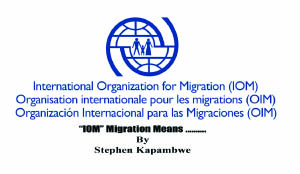 On International Migrants Day 2014, December 18th, IOM Director General William Lacy Swing calls for urgent action to save the lives of migrants and stop smugglers from exploiting their desperation to extort huge sums of money.
On International Migrants Day 2014, December 18th, IOM Director General William Lacy Swing calls for urgent action to save the lives of migrants and stop smugglers from exploiting their desperation to extort huge sums of money.
IOM data shows that the number of migrants dying on dangerous journeys in the hope of finding better lives for themselves and their families is rising.
Some 5,000 migrants (4,868) lost their lives this year at sea or in remote deserts or mountains. This makes 2014 the deadliest year on record, with double the number of last year’s deaths.
The highest death toll was in the Mediterranean, where over 3,000 people drowned after embarking on unseaworthy boats. Over 540 migrants also died in the Bay of Bengal and at least 307 died trying to cross the land border between Mexico and the USA.
“We must address the drivers of desperation migration and act in concerted and coherent partnership,” says Ambassador Swing. “This is a battle we must fight together. We need more political leadership and the courage to counter the worrying rise of xenophobia.”
He lists three priorities to protect vulnerable migrants and reduce the number of deaths: saving lives; addressing the drivers of irregular migration; and partnering for effective action.
“All States have the international obligation to save the lives of those seeking help. Rescue operations should continue in the international waters of the Mediterranean. The current operation, Triton, while laudable, covers too small an area,” he notes.
IOM fears that number of deaths at sea could rise, if the European Union (EU) fails to put in place a comprehensive and well-equipped rescue operation in the Mediterranean to replace Italy’s now discontinued Mare Nostrum.
Countries must also pass laws to crack down on the smugglers, not on the irregular migrants, according to the IOM Director General.
“Governments should de-criminalize irregular migrants so that they can report smugglers to the police for prosecution and contribute to efforts against trans-national organized crime,” he says.
With 33.3 million people internally displaced and 16.7 million refugees, the number of people displaced by violence and conflict today in the world is the highest since World War ll.
An unprecedented number of man-made crises in the world, including in Syria, Iraq, Libya, the Central African Republic (CAR) and South Sudan; Ebola impacting the economies of West Africa; climate change and extreme weather events are all factors driving migration that must be addressed.
To address this “desperation migration”, IOM wants to see better access to safe, regular migration. This includes promoting labour migration partnerships and family re-unification, providing clear information about the risks of irregular migration, and supporting community stabilization and job creation efforts in countries of origin.
Around 232 million people are international migrants. While the number of international migrants has increased in absolute terms, the share of international migrants in the world population remains constant at around three per cent.
“Migration is not only inevitable, but also necessary and desirable,” says Ambassador Swing. Societies are ageing in the North, while in the South, young populations are growing. The rise of anti-migrant sentiment is a cruel irony at a time when ageing societies need migration to provide much-needed labour,” he observes.
“The international community must work together to change the actual migration narrative to something more positive, focusing on what migrants contribute to their host countries, as well as their countries of origin, which benefit hugely from the remittances they send home,” he adds.






